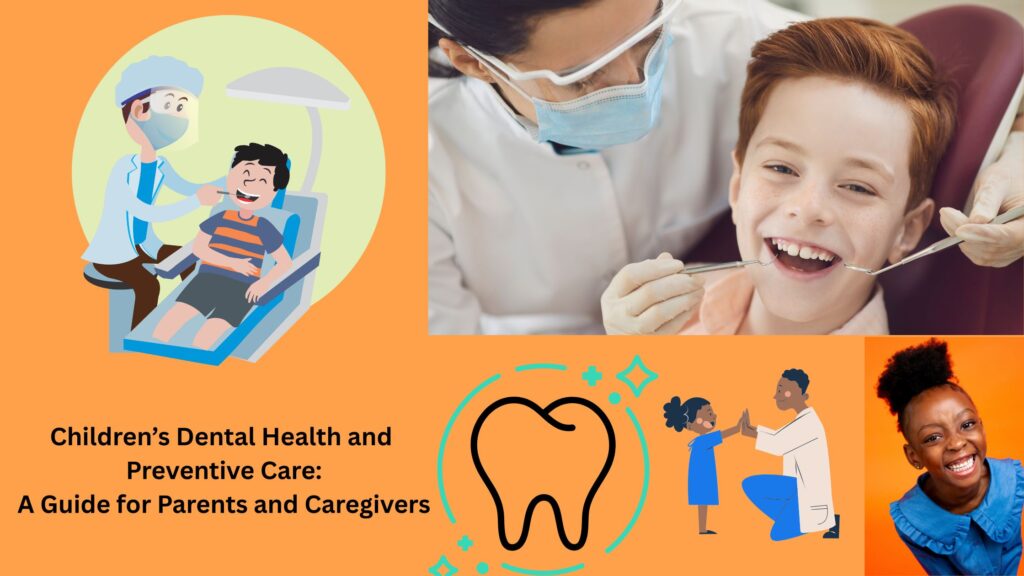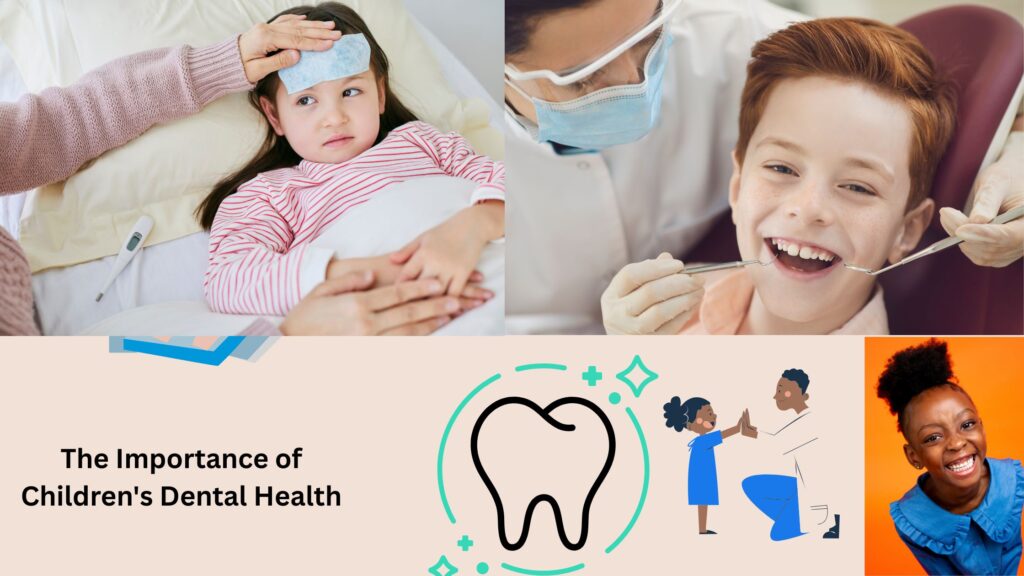
Maintaining good dental health from a young age is crucial for children’s overall well-being and future oral health. Early preventive care not only helps prevent cavities and gum disease but also sets the foundation for lifelong healthy habits. As parents and caregivers, understanding the importance of children’s dental health and how to promote it is essential. This blog will explore the key aspects of children’s dental health and offer practical tips for effective preventive care.
The Importance of Children’s Dental Health
Understanding children’s dental health is essential for developing good oral hygiene habits early on.

Oral health plays a vital role in children’s overall health, development, and self-esteem. Dental problems, if left untreated, can cause pain, difficulty eating, speech issues, and even impact a child’s ability to concentrate and learn. Additionally, poor dental health can lead to more serious health implications later in life, including periodontal disease and tooth loss.
Neglecting children’s dental health can lead to more severe issues such as chronic pain and speech problems.
Good children’s dental health practices are crucial as they affect long-term oral outcomes.
Inadequate attention to children’s dental health can result in costly treatments in the future.
Awareness of children’s dental health is vital for parents to take proactive measures.
Early childhood is the critical period for establishing dental health habits. Decay-causing bacteria can be transmitted from parents or caregivers, and habits formed early can influence dental health throughout life. Therefore, proactive measures and regular dental visits are essential.
Common Dental Issues in Children
Before diving into preventive care, it’s important to recognize common dental issues that children face:
- Tooth Decay (Caries): The most common childhood dental problem, caused by bacterial activity on teeth in the presence of sugar.
- Gum Disease: Less common in very young children but can develop if oral hygiene is neglected.
- Early Tooth Loss: Often result of decay or trauma.
- Malocclusion: Misaligned teeth which may require orthodontic intervention later.
Establishing Good Oral Hygiene Habits
Children’s dental health can be significantly improved through proper education and mentorship.
Building good dental habits early is fundamental to preventive care. Here are some guidelines for parents:
Brushing
- Start early: Use a soft-bristled child’s toothbrush as soon as the first tooth erupts.
- Proper technique: Teach children to brush twice a day — morning and night — for at least two minutes each time.
- Fluoride toothpaste: Use a pea-sized amount of fluoride toothpaste to strengthen enamel and prevent decay. Ensure children do not swallow toothpaste.
Flossing
- Introduce flossing early: Once two teeth touch, flossing can help remove food particles and plaque between teeth.
- Supervision: Parents should assist and supervise children’s flossing until they can do it effectively themselves.
Diet and Nutrition
- Limit sugary foods and drinks: Frequent intake of sweets, candies, and sugary beverages increases decay risk.
- Encourage healthy snacks: Fruits, vegetables, cheese, and nuts are good options.
- Drink water: Especially fluoridated water can help protect teeth.
Regular Dental Visits
Routine dental check-ups are vital for early detection and prevention. The American Academy of Pediatric Dentistry recommends that children see a dentist by their first birthday or within six months of the first tooth erupting.
Dental visits allow for professional cleaning, fluoride treatments if necessary, and assessment of development and oral health. Dentists can also provide personalized advice and address any concerns early.
Encouraging a healthy relationship with food contributes to children’s dental health.
Fluoride: A Key Preventive Measure
Fluoride strengthens enamel and makes teeth more resistant to decay. Many communities add fluoride to water supplies, but additional topical fluoride treatments or supplements may be recommended by your dentist based on specific needs.
Dental Sealants: A Protective Barrier
Sealants are thin plastic coatings applied to the chewing surfaces of molars to prevent food and bacteria from settling into grooves and pits. Sealants are especially effective in preventing cavities in children’s back teeth and are typically recommended once molars have erupted, usually by ages 6-12.
Avoiding Harmful Habits
Regular check-ups are essential for maintaining children’s dental health.
Certain habits can negatively impact dental health:
Fluoride treatments can play a significant role in enhancing children’s dental health.
- Thumb-sucking and pacifier use: Prolonged habits can affect teeth alignment.
- Nail-biting: Can cause chipped or cracked teeth.
- Using teeth as tools: Opening bottles or tearing packaging with teeth can damage enamel.
Dental sealants are an effective way to protect children’s dental health.
Encouraging children to avoid these habits helps maintain healthy dental development.
Addressing harmful habits can significantly improve children’s dental health outcomes.
Addressing Dental Emergencies and Orthodontic Needs
Accidents happen; knowing how to handle dental injuries is essential. For knocked-out teeth, preserve the tooth in milk or saliva and seek emergency dental care promptly.
Orthodontic concerns such as misaligned teeth can be addressed at appropriate ages, often starting with preventive orthodontic assessments around age 7.
Building a Positive Dental Experience
Fear of the dentist can hinder children from seeking necessary care. Foster a positive attitude by:
- Visiting pleasant, child-friendly dental clinics
- Using positive language (“gentle cleaning,” “checking your teeth”)
- Reading books or watching videos about dental visits
- Praising children for good cooperation
Understand how to prevent accidents for better children’s dental health management.
A positive experience encourages routine dental visits and lifelong oral health habits.
Educating Children about Dental Health
Incorporate fun activities like brushing charts, teeth-themed games, storytelling
Use a Brushing Chart
- Sticker Rewards: Create a colorful brushing chart and let your child place a sticker every time they brush their teeth. Offer a small reward when they fill up a week’s worth of stickers.
- Brushing Apps: There are many apps designed to make brushing fun. These apps often include songs and games that make the two-minute brushing time fly by.
- Sing Brushing Songs: Music is a great way to keep kids engaged while brushing their teeth.
A positive experience at the dentist can have a lasting impact on children’s dental health.
Educating children about the importance of their own children’s dental health is paramount.
To know more, please visit Noble Dental Clinic and Tyagi Nursing Home Dental Clinic
Dr. (Capt.) P. C. Tyagi,
Enhance Your Child’s Smile with Expert Pediatric Dental Care at Noble Dental Clinic
At Noble Dental Clinic, we understand that children’s dental health is vital for their overall well-being and confidence. Our specialized pediatric dentistry services are designed to ensure your child’s teeth grow healthy and strong from the very beginning.
Why Children’s Dental Health Matters
Starting proper oral hygiene early helps prevent cavities, gum disease, and other dental issues. Regular dental checkups and preventive care promote healthy teeth, fresh breath, and beautiful smiles that last a lifetime.
Essential Pediatric Dental Services We Offer
- Routine Dental Checkups & Cleanings: Regular visits help monitor development and catch issues early.
- Preventive Treatments: Fluoride applications and dental sealants protect children’s teeth from decay.
- Cavity Management: Gentle and effective treatment for childhood cavities.
- Orthodontic Screenings: Early assessment for braces or other orthodontic appliances.
- Dental Education: Teaching kids fun ways to maintain excellent oral hygiene at home.
- Nutritional Guidance: Advising on dental-friendly diets to promote healthy teeth.
Tips for Parents to Maintain Kids’ Dental Health
- Brush twice daily with a fluoride toothpaste.
- Floss regularly to remove plaque between teeth.
- Limit sugary snacks and beverages.
- Ensure your child visits the dentist biannually.
- Encourage a balanced diet rich in fruits, vegetables, and dairy.
Visit Noble Dental Clinic for Pediatric Dental Excellence
Our friendly and experienced team provides a comforting environment for children, making dental visits enjoyable and anxiety-free. Early intervention, preventive care, and education are the keys to a lifetime of healthy smiles.
Contact us today to schedule your child’s dental appointment and give them the gift of a healthy smile!

